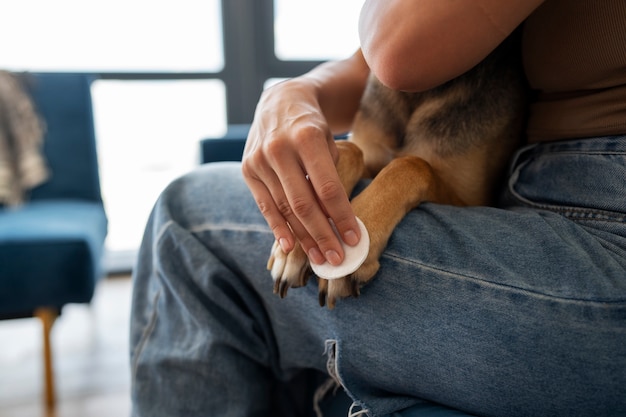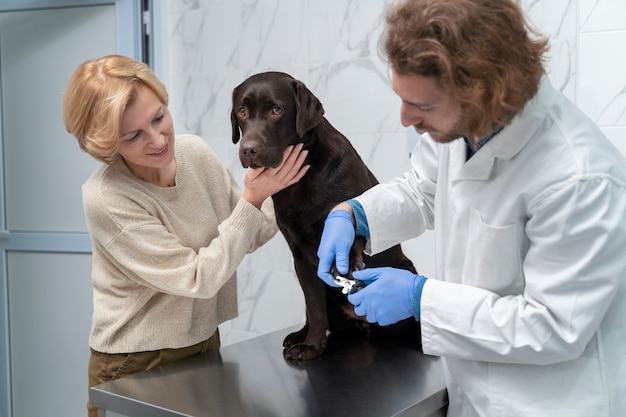Is That Lump Serious? Identifying Cancer Symptoms in Cats and Dogs


Is That Lump Serious? Identifying Cancer Symptoms in Cats and Dogs
If you have ever discovered an unusual lump on your dog or cat or noticed changes in their behavior that seemed out of the ordinary, you know how quickly concern can set in. For many pet owners in Coral Springs and surrounding communities, the question of whether a new lump or subtle symptom could be a sign of something serious is both worrying and urgent. At Veterinary Cancer Health, located at 4101 Turtle Creek Drive, Coral Springs, FL, our oncology-focused team understands these fears and is here to guide you through the process of recognizing potential cancer symptoms in pets.
In this blog, we will discuss the most common warning signs of cancer in cats and dogs, explain what causes these symptoms, and outline the next steps you should take if you notice any changes. Our goal is to help you understand when a lump on a dog or cat or other concerning signs warrant a visit to a veterinary oncology specialist. We will also touch on advanced cancer diagnostics and treatment options available right here in Coral Springs. If you are searching for an "oncology vet near me" or need expert advice on cancer symptoms in pets, you are in the right place. For those worried about a new growth or behavioral shift, early evaluation can be critical—learn what to watch for and how prompt care can make a difference for your furry family member.
Recognizing Cancer Symptoms in Pets: What to Watch For
Spotting cancer symptoms in pets can be challenging, as many signs are subtle or can mimic less serious health issues. Pet owners often first notice a lump on a dog or cat during a routine petting session or while grooming. While not every bump signals cancer, persistent or rapidly growing masses should never be ignored.
Key symptoms of cancer in pets include the appearance of any new lump or swelling, especially if it enlarges over time or changes in texture. Additional warning signs are unexplained weight loss, a decrease in energy or activity levels, and changes in appetite. Some pets may experience persistent coughing, difficulty breathing, or gastrointestinal issues such as vomiting or diarrhea. Other symptoms to watch for are wounds that do not heal, ongoing lameness, or stiffness that does not improve. In cats, subtle changes like excessive hiding, reduced grooming, or vocalizing more than usual can also indicate underlying problems.
Behavioral changes are another important clue. A normally friendly cat that suddenly avoids interaction or a dog that becomes withdrawn or irritable may be experiencing discomfort. Because cancer can affect any part of the body, symptoms can vary widely based on the location and type of tumor. If you notice any of these changes in your pet, especially in conjunction with a lump or bump, it is wise to seek guidance from a veterinary oncology expert in Coral Springs.
Understanding Why Cancer Develops in Cats and Dogs
Cancer in pets is caused by abnormal cell growth that can occur almost anywhere in the body. These changes can be triggered by a combination of genetic predisposition, environmental factors, and age. As pets age, their risk of developing cancer increases; this is especially true for certain breeds with known hereditary susceptibility.
Environmental exposures, such as secondhand smoke, some chemicals, or excessive sun exposure, may also contribute to cancer risk. In many cases, the exact cause remains unknown, and cancer can develop despite a pet's healthy lifestyle and attentive care. For example, a lump on a dog or cat might represent a benign fatty mass, an infection, or a cancerous tumor. Only specialized diagnostic testing can determine the nature of the lump and the best course of action.
At Veterinary Cancer Health, our team of veterinary oncologists utilizes advanced diagnostic tools, including biopsy and cytology services, ultrasound, digital radiographs, CT scans, and DNA sequencing to accurately identify and stage cancer in pets. These technologies allow us to pinpoint the type, location, and progression of cancer, which is essential for developing an effective treatment plan tailored to your pet's unique needs. When searching for "pet cancer diagnosis in Coral Springs," know that our clinic offers one of the most comprehensive approaches in the region.
Treatment Options for Cancer in Pets: What to Expect from a Veterinary Oncology Team
When a cancer diagnosis is confirmed in your dog or cat, the treatment journey can feel overwhelming. Fortunately, advances in veterinary oncology have expanded the options available, improving both quality and length of life for many pets. Treatment approaches involve a combination of therapies depending on the type and stage of cancer, as well as your pet's overall health.
Chemotherapy, targeted therapy, and immunotherapy are among the most common treatments we offer at Veterinary Cancer Health. Chemotherapy uses medications that target and destroy rapidly dividing cancer cells, while targeted therapy is designed to interfere with specific molecules involved in cancer growth. Immunotherapy harnesses the pet's own immune system to fight cancer cells. For many cases, a customized combination of these treatments provides the best outcomes. Our veterinary oncologists also use advanced diagnostics to monitor your pet's response and adjust therapies as needed throughout the process.
Pain management and palliative care are crucial components of cancer treatment, ensuring your pet remains comfortable and supported during their journey. Our commitment to ongoing care is reflected in regular recheck exams, bloodwork, and detailed treatment plan adjustments based on your pet's progress.
To learn more about how chemotherapy may fit into your pet's personalized plan, you can explore our chemotherapy and medical treatments page. For those seeking specialized veterinary oncology services near me, our clinic in Coral Springs is equipped to provide the latest in cancer care for pets.
What You Can Do: Prevention and Home Care for Pet Cancer
While not all cancers can be prevented, you can take meaningful steps to support your pet's health and increase the likelihood of early detection. The most important action is to remain vigilant and observant of changes in your pet's body and behavior. Regularly petting and grooming your cat or dog allows you to spot new lumps or bumps early. If you notice a lump on your dog or cat, monitor its size, shape, and texture for any changes over time.
Maintaining regular veterinary checkups is essential, as your primary care veterinarian can identify subtle abnormalities during routine exams. If your pet is older or has a history of health concerns, more frequent visits may be beneficial. Feeding a balanced diet, providing regular exercise, and minimizing exposure to known carcinogens like cigarette smoke or certain chemicals will also support your pet's overall well-being.
For pet cancer monitoring and ongoing support, our clinic offers ongoing cancer care and monitoring to track your pet's progress and provide guidance every step of the way. Whether your pet is in active treatment or remission, our veterinary oncology professionals are here to answer questions and address any concerns that arise.
When to Seek Veterinary Care: Knowing When Expert Help is Needed
Deciding when to take your pet to a veterinary oncology specialist can feel daunting, especially if symptoms seem mild or come and go. However, prompt evaluation can make a significant difference in outcomes, especially for cancer cases where early intervention is critical. If you discover a new lump on your dog or cat that persists for more than a few days, rapidly increases in size, or changes in appearance, it is time to seek professional assessment.
Other clear signals to seek immediate veterinary attention include unexplained weight loss, decreased energy, ongoing lameness, wounds that do not heal, or noticeable pain. Even if you are unsure whether symptoms are serious, consulting with a veterinary oncologist in Coral Springs can provide peace of mind and, when needed, lead to early diagnosis and treatment.
If your primary care veterinarian has already evaluated your pet and you are looking for a specialist vet near me, Veterinary Cancer Health welcomes referrals and second opinions. Our oncology professionals collaborate closely with primary care veterinarians to ensure your pet receives seamless, coordinated care. For those in Coral Springs and the surrounding area, cancer diagnosis and staging services are available to help you understand your pet's condition and the best next steps.
Remember, do not delay seeking care if you have concerns—timely intervention is often key to successful management of cancer symptoms in pets.
Compassionate Support for You and Your Pet: Next Steps in Coral Springs
Facing the possibility of cancer in your beloved companion can be overwhelming, but you do not have to navigate this journey alone. At Veterinary Cancer Health, our veterinary oncology team is committed to providing compassionate, advanced cancer care for dogs and cats throughout Coral Springs and surrounding communities. From the moment you notice a lump on your dog or cat or any other concerning symptom, we are here to support you with expert diagnostics, individualized treatment plans, and ongoing guidance.
If you are searching for an "oncology veterinarian near me" or need help understanding cancer symptoms in pets, reach out to our clinic for reassurance and direction. Our specialists will work alongside you and your primary care veterinarian to create the best possible plan for your pet’s health and comfort. For more information or to schedule a consultation, call our team at (195) 459-28504 or visit us at 4101 Turtle Creek Drive, Coral Springs, FL.
For additional details about our comprehensive approach, you can read more about ongoing cancer care and monitoring or explore cancer diagnosis and staging services on our website.
Your pet’s health and happiness matter deeply to us. Do not hesitate to reach out if you notice a lump, behavioral change, or any sign that makes you worry. Our veterinary oncology team is your trusted resource for cancer care in Coral Springs and a valued partner for your pet’s well-being.
This article provides general information about cancer symptoms in pets and is not a substitute for professional veterinary advice. For specific concerns about your pet’s health, consult your veterinarian or a veterinary oncology specialist.

.png)















